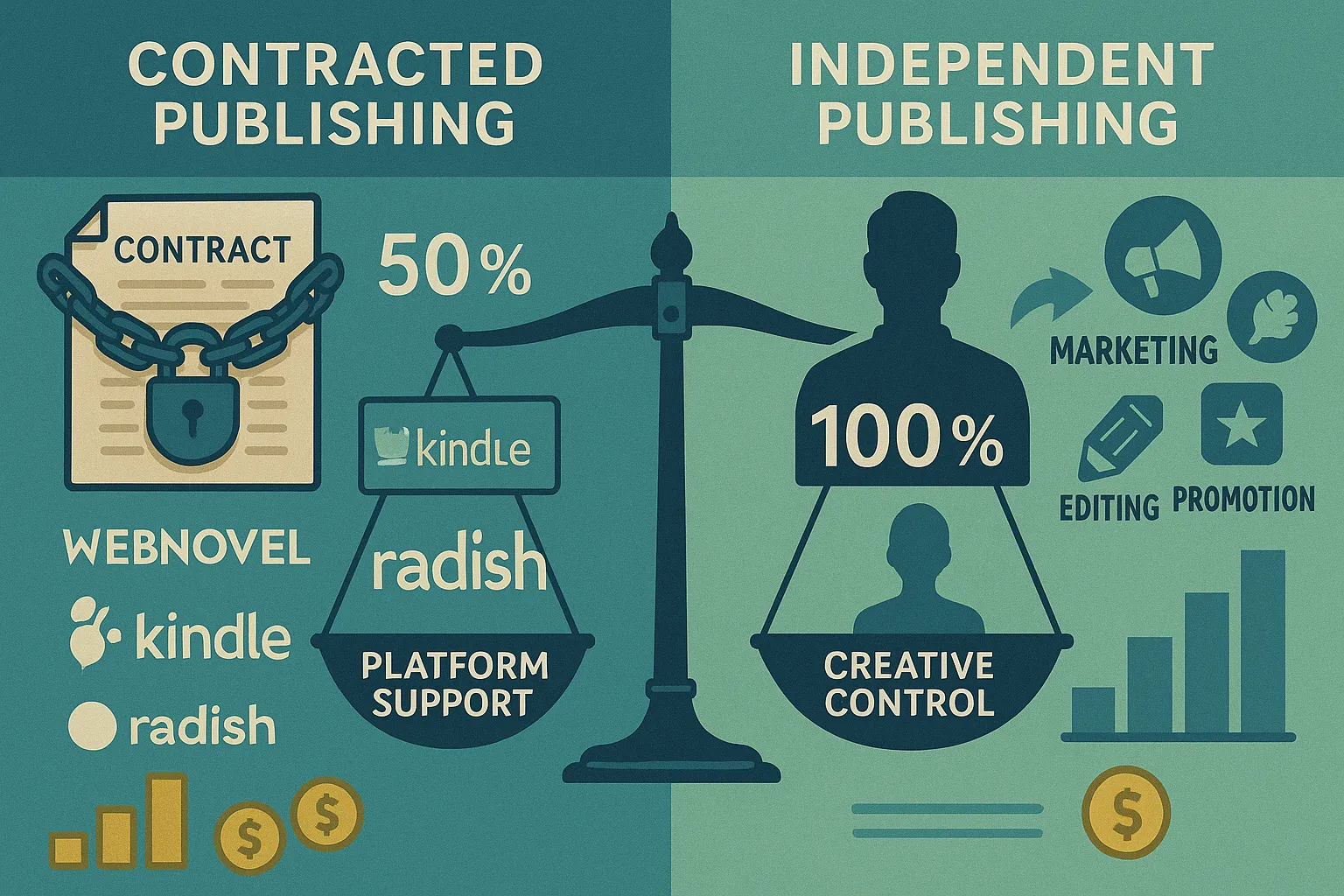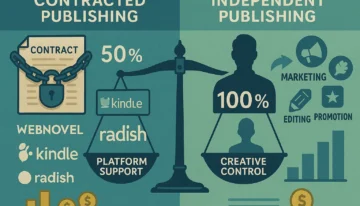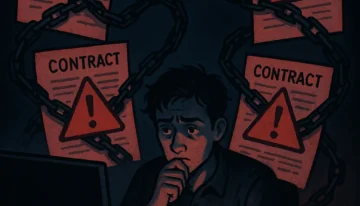The Author’s Contract Guide: Platform Revenue Shares and Author Entitlements
Understanding platform contracts and revenue sharing models is crucial for web novel authors considering their publishing options. Each platform offers different terms, payment structures, and author benefits that can significantly impact long-term earnings and creative control.
Major Platform Revenue Sharing Models
WebNovel.com (Qidian International)
After signing the Webnovel contract, you are now entitled to 50% net revenue from your novel. If they make an audiobook, translations works, and physical publications, you’ll get 50% net revenue.
Revenue Structure:
- Standard Split: 50% net revenue to author, 50% to platform
- Payment Threshold: Webnovel will only payout the money when you earn USD200 or more for that month
- Rollover System: Earnings below $200 roll over to subsequent months until threshold is met
Author Entitlements:
- Revenue from original work
- 50% of audiobook adaptations
- 50% of translation rights
- 50% of physical publication rights
- Platform promotional support
- Editorial guidance and feedback
Key Concerns: Industry watchdogs have raised significant red flags about WebNovel contracts, particularly regarding intellectual property ownership and author rights retention.
Amazon Kindle Vella
Note: Amazon made the difficult decision to wind down Kindle Vella February 26, 2025
Revenue Structure (Historical):
- Kindle Vella authors earn 50% royalties “…of what readers spend on the Tokens that are used to unlock your story’s episodes.”
- Token-based payment system
- When a reader purchases 200 tokens for $1.99 and reads a story with 50 tokens, the author gets $0.25
Payment Calculation: Kindle Vella’s royalty formula per episode: (Number of Tokens to unlock episode) x (Tokens bundle price / # Tokens in bundle – taxes and fees) x (50% revenue share)
Radish Fiction
Revenue Structure:
- Micropayment system similar to mobile games
- Authors receiving a range of $3,000-13,000/month for successful titles
- Episode-based monetization model
Author Benefits:
- Higher potential earnings for popular content
- Mobile-optimized reading experience
- Established advertising and promotion system
Webtoon (Naver)
Revenue Structure:
- Only Originals creators earn steady income through individual contracts with set amounts per episode
- Ad revenue sharing program for Canvas creators
- Tiered system: Canvas (free) vs Originals (contracted)
Author Benefits:
- Global platform reach
- Professional editorial support for Originals
- Canvas serves as pipeline to Originals contracts
- Strong community and discoverability tools
Tapas
Revenue Structure:
- Creators with 100+ subscribers earn about 70% of ad revenue
- Now owned by Kakao Entertainment (acquired for $510 million)
- Support system for both webtoons and web novels
Author Benefits:
- Higher ad revenue percentage (70% vs typical 50%)
- Multi-format support (comics and novels)
- Backing of major Korean entertainment company
- Growing focus on webnovel expansion
Kakao Entertainment Ecosystem
Multiple Platforms:
- Kakao Page (Korea-focused)
- Tapas (Global, acquired 2021)
- Piccoma in Japan with 414.6 billion won in transactions
Revenue Structure:
- Varies by platform within ecosystem
- Focus on paid content and premium models
- Strong performance in Asian markets
Wattpad (Now Part of Naver)
Revenue Programs:
- Wattpad Paid Stories program
- Creator contracts with lump sum payments and exclusivity deals
- Over $1 million in author earnings from Paid Stories program by 2021
Author Benefits:
- 2-year exclusivity contracts with upfront payments
- Access to adaptation opportunities (TV, film)
- Large global readership base
- Pipeline to traditional publishing deals
Inkitt & Galatea
Revenue Structure:
- AI-driven selection process for Galatea publishing
- Galatea subscription app with $69.99 annual fee
- Over $38 million run rate for paid content
- Authors selected based on data science and reader engagement
Author Benefits:
- Data-driven discovery and promotion
- Multimedia adaptation opportunities (GalateaTV)
- Sequel and spinoff development
- Immersive reading experience integration
Dreame (Stary Platform)
Revenue Structure:
- 30% of net revenue to authors (reduced from previous 50%)
- Non-exclusive contracts in some cases
- Focus on romance and fantasy genres
Warning Notes:
- Writer Beware has issued alerts about contract terms
- Lower revenue share compared to other platforms
- Terms have become less author-friendly over time
Contract Terms Comparison
Revenue Share Models
| Platform | Author Share | Platform Share | Payment Model |
|---|---|---|---|
| WebNovel | 50% net | 50% | Monthly ($200 minimum) |
| Kindle Vella | 50% gross | 50% | Token-based (discontinued) |
| Radish Fiction | Variable | Variable | Micropayments |
| Tapas | 70% ad revenue | 30% | Ad-based (100+ subscribers) |
| Webtoon Originals | Set per episode | Platform funded | Contract-based |
| Kakao Platforms | Variable | Variable | Paid content focus |
| Wattpad Paid Stories | Varies | Varies | Lump sum + exclusivity |
| Inkitt/Galatea | AI-selected | Platform revenue | Subscription-based |
| Dreame | 30% net | 70% | Monthly revenue share |
Intellectual Property Rights
WebNovel Concerns:
- Extensive IP control clauses
- Restrictions on publishing similar content elsewhere
- Long-term or perpetual rights assignments
- Limited author termination options
Amazon Kindle Vella:
- More author-friendly IP retention
- Non-exclusive arrangements in many cases
- Clear termination procedures
Radish Fiction:
- Platform-specific terms vary
- Generally less restrictive than WebNovel
What Contracted Authors Are Entitled To
Standard Benefits Across Platforms:
- Revenue Sharing: Typically 50% of net or gross revenue
- Promotional Support: Platform featuring and marketing
- Editorial Assistance: Feedback and content guidance
- Analytics Access: Reader engagement and performance data
- Community Tools: Author dashboards and reader interaction features
Additional Monetization Rights:
- Adaptation Rights: Revenue from audiobooks, translations
- Merchandising: Character and story-based products
- Licensing: Film, TV, and game adaptation opportunities
- International Distribution: Access to global markets
Platform-Specific Perks:
WebNovel Contracted Authors:
- Access to exclusive author events
- Priority customer support
- Advanced analytics and reader insights
- Participation in platform contests and promotions
Radish Fiction Authors:
- Mobile-first optimization
- Gamified reading experience integration
- Advanced monetization through micro-transactions
Webtoon Originals Authors:
- Guaranteed per-episode payments
- Professional editorial and marketing support
- Global platform distribution
- Potential for media adaptation opportunities
Tapas Creators:
- Higher ad revenue percentage (70%)
- Multi-format publishing (comics and novels)
- Kakao Entertainment backing and resources
- Cross-platform promotion opportunities within ecosystem
Payment Structures and Thresholds
Monthly Minimums:
- WebNovel: $200 minimum monthly payout
- Most Platforms: $10-$100 typical minimums
- Rollover Policies: Vary by platform
Payment Methods:
- PayPal (most common)
- Direct bank transfer
- Wire transfers for international authors
- Platform-specific payment systems
Red Flags in Author Contracts
Terms to Watch For:
- Perpetual Rights: Contracts with no clear termination
- Broad IP Claims: Rights extending to “similar works”
- Revenue Definition: “Net” vs “gross” revenue calculations
- Exclusivity Clauses: Restrictions on publishing elsewhere
- Termination Difficulty: Limited author exit options
Questions to Ask Before Signing:
- Can I retain copyright ownership?
- What constitutes “net revenue”?
- How can I terminate the contract?
- What happens to my work if the platform closes?
- Can I publish similar content on other platforms?
The Economics of Platform Contracts
Break-Even Analysis:
For authors to benefit from platform contracts, they typically need:
- Consistent monthly readership of 1,000+ active readers
- Regular content updates (weekly minimum)
- Strong engagement metrics (comments, likes, shares)
- Genre alignment with platform preferences
Long-Term Considerations:
- Growth Potential: Platform marketing vs. independent promotion
- Audience Ownership: Direct reader relationships vs. platform mediation
- Creative Freedom: Editorial input vs. complete autonomy
- Revenue Ceiling: Platform splits vs. full revenue retention
Making the Contract Decision
The choice between platform contracts and independent publishing ultimately depends on individual author priorities:
Choose Contracts If:
- You need immediate income stability
- You want professional editorial support
- You prefer platform-handled marketing
- You’re comfortable with revenue sharing
Stay Independent If:
- You prioritize creative control
- You want to maximize long-term earnings
- You’re willing to handle business aspects
- You value intellectual property ownership
Understanding these contract structures and revenue models helps authors make informed decisions about their publishing strategy, whether pursuing platform partnerships or maintaining creative independence.
Contract terms and revenue structures change frequently. Always review current platform agreements and consider legal consultation before signing any publishing contract.








